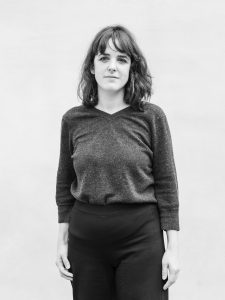Marta Torres Ruiz

Shortbio
- Geb. 1981 (Madrid)
- 2018- 2019 wissenschaftliche Mitarbeiterin (Forschung und Lehre) am Institut für Architektur der TU Berlin, Fachgebiet Architekturdarstellung und Gestaltung
- seit 2017 selbstständige Praxis im Bereich Architektur und Städtebau, Büropartnerschaft mit Ali Saad
- 2014-2017 Projektleiterin im Architekturbüro augustinundfrankarchitekten
- 2010-2014 Projektleiterin und freie Mitarbeiterin in diversen Architekturbüros in Deutschland und Indien
- 2004-2010 Studium der Architektur, Abschluss Dipl. Ing., Technische Universität Berlin
- 2001-2003, Studium der Philologie (Spanisch, Anglistik), FU Berlin
Contact
Technische Universität Berlin
Fakultät VI – Planen Bauen Umwelt
Institut für Stadt- und Regionalplanung
Fachgebiet Denkmalpflege
DFG-Graduiertenkolleg 2227 „Identität und Erbe“
D-10623 Berlin
Sitz: Ernst-Reuter-Platz 1 | BH-A 340
D-10587 Berlin
“Sitehardening” and “Coping” Infrastructures of Overtourism – Active Form(s) of Space and Identity Production for World Heritage Sites (working title).
The modern global growth of the tourism industry is accompanied by large-scale transformations of urban and landscape spaces with consequences for the economy, ecology and society, which are currently evaluated as conflicts under the term of overtourism.
In fact, due to the necessity of opening up to as large a mass as possible, specially designed infrastructures of tourist valorization are created around monuments, natural spectacles and places of cultural consumption.
This goes so far that historical facilities and sites are reconstructed from their orientation toward the object or split off from urban operations. Examples include the expansion of the sacred precinct in Mecca, the replicas of the Lascaux II, III and IV caves, the temporary installation of access barriers and the introduction of entrance fees in Venice.
In addition to “site-management” strategies that describe the operation of tourist sites, infrastructural physical and non-physical conservation measures are instrumental to mass management and tourist supply. These are summarized under the terms of “sitehardening” and “coping” and form the focus of the paper.
In this context, the directly clashing “super-modern” means of these infrastructures, vis-à-vis the “anthropological site” (M. Augé) of the World Heritage Site, trigger a contradiction in terms of the notion of identity and authenticity. At the same time, the interplay of “sitemanagement”, “sitehardening” and “coping” measures gives rise to a new spatial category that has not been sufficiently investigated so far.
The dissertation project aims to investigate this “type of overtourism” as an independent formation process or “active form” (K. Easterling) of space and identity production. In doing so, the thesis uses case studies of current strategies at specific cultural World Heritage sites to explore the question of which new spatial narratives, socio-political constructions, and actor constellations are invoked to stabilize, develop, and commercialize cultural heritage in times of overtourism, and how these relate to the concept of “cultural heritage” as formulaic constructions.